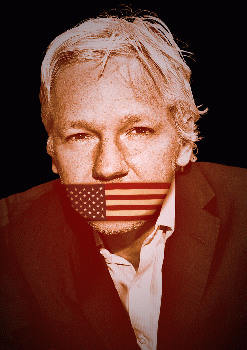From Jonathan Cook Blog
There was a hope in some quarters after Judge Vanessa Baraitser ruled on Monday against an application to extradite Julian Assange to the US, where he faced being locked away for the rest of his life, that she might finally be changing tack.
Washington has wanted Assange permanently silenced and made an example of -- by demonstrating to other journalists its terrifying reach and powers of retaliation -- ever since the Wikileaks founder exposed US war crimes in Iraq and Afghanistan a decade ago.
There were reasons, however, to be suspicious of what Baraitser was really up to even as she made her ruling in Assange's favor. This district judge has a record of nodding through extradition cases, including several that have recently been overturned on appeal by a higher court.
During the hearings back in September, Baraitser had endlessly indulged lawyers representing the US while showing absolute disdain for Assange's legal team, obstructing them at every turn. Her contempt for Assange and his political and moral worldview was on show throughout the proceedings. She often arrived in court with a prepared script she read from, barely feigning a pretense that she had listened to the legal arguments presented in court.
Her script always favored Washington's line, apart from on those occasions when she took an even more hostile position towards Assange than requested by the US. That included sealing him off from the rest of the court in an impregnable perspex box, treating him more like Hannibal Lecter than a publisher and journalist fighting for press freedom.
Much of the time, Baraitser sounded unnervingly like a prosecution barrister rather than the judge.
First, a dangerous ruling
So it was barely surprising, as I explained in my last post, that, while denying the extradition claim, she supported all the arguments advanced by the US accruing to itself the right to prosecute Assange - and any other journalist - for the crime of doing journalism. She ignored the facts, the expert testimony presented in court and the legal arguments -- all of which favored Assange -- and backed instead what amounted to a purely political case made by the US.
She disregarded warnings from Assange's legal team that acceptance of the political rationale for extradition amounted to an all-out attack on fundamental journalistic freedoms. She established a terrifying legal precedent for the US to seize foreign journalists and prosecute them for "espionage" if they expose Washington's crimes. Her ruling will inevitably have a profoundly chilling effect on any publication trying to dig out the truth about the US national-security state, with terrifying consequences for us all.
But while she enthusiastically backed the political case for Assange's extradition and trial, Baraitser at the same time got the Wikileaks founder off the hook by accepting the humanitarian concerns raised by medical and prison experts. They had counseled that extradition to the US could be expected to lead to Assange spending the rest of his life in a barbaric US super-max prison, exacerbating mental health problems and the risk of suicide.
Then, a perverse rulingHer ruling, while deeply disturbing in its political and legal implications, did at least suggest that Baraitser was ready to take a compassionate approach in regard to Assange's health, even if not his journalistic exposure of western war crimes. He should have walked free there and then, had the US not immediately said it would appeal her decision.
(Note: You can view every article as one long page if you sign up as an Advocate Member, or higher).






